|
|
|
Sort Order |
|
|
|
Items / Page
|
|
|
|
|
|
|
| Srl | Item |
| 1 |
ID:
118607
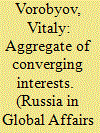

|
|
|
|
|
| Publication |
2012.
|
| Summary/Abstract |
As the center of gravity in global development shifts towards the Asia-Pacific region, the political significance of Central Asia as Eurasia's geopolitical core increases. China's rapidly evolving cooperation with this region becomes increasingly tight. But what interests lie behind this process? And how lasting can such cooperation be?
|
|
|
|
|
|
|
|
|
|
|
|
|
|
|
|
| 2 |
ID:
100334
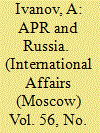

|
|
|
|
|
| Publication |
2010.
|
| Summary/Abstract |
TEN YEARS AGO when the Asian countries were extricating themselves from the 1997 Asian financial crisis few expected the vast Asian-Pacific Region (APR) to become the locomotive of global development of the 21st century. The locomotive, meanwhile, remained as efficient as ever at the peaks of the current world financial and economic crisis. Indonesia (the GDP of which increased by 4.5% in 2009 and is moving toward 6% in 2010) is rapidly catching up with China and India, the new leaders of economic advance in the APR. According to Merrill Lynch in 2009 the total private assets of the APR countries increased by 31% (the world's highest) to reach $9.7 trillion; in the same year the number of dollar millionaires in Asia increased by 26% to come even with the European figure of 3 million (North America is home to 3.1 million). The Boston Consulting Group forecasted that in 2010 the level of wealth in the APR will go up twice as fast as the world's average; this explains a broader and more active involvement of banking giants Barclays, Morgan Stanley and UBS in Asia.
The economic upsurge of the APR is highly important for Russia which is the region's inalienable and fairly large part. When dealing with Russia's application to the Asia-Europe Meeting (ASEM) and the need to include it in either the Asian or European part the Meeting was confronted with the dilemma which had kept the Slavophiles and Westerners busy for a long time. Resolved by famous Russian poet Alexander Blok who called Russians "leafs of the Asian tree" the issue acquired an international political-economic dimension in the globalization era.
|
|
|
|
|
|
|
|
|
|
|
|
|
|
|
|
| 3 |
ID:
156351
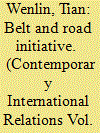

|
|
|
|
|
| Summary/Abstract |
Capitalism has intensified the rich-poor divide and power politics have led to great upheavals. The world is calling for new development concepts. The B&R has emerged as an answer. It embodies China's ideas on global development. however many difficulties and challenges lie ahead for the implementation of the B&R initiative.
|
|
|
|
|
|
|
|
|
|
|
|
|
|
|
|
| 4 |
ID:
149712
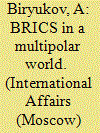

|
|
|
|
|
| Summary/Abstract |
Since 2009, the countries brought together by this acronym have held seven summits that have become the group's main institutional mechanism. BRICS is chaired on a rotating basis, with each member country presiding in the group for one year. In 2016, India has replaced Russia as BRICS chair.
|
|
|
|
|
|
|
|
|
|
|
|
|
|
|
|
| 5 |
ID:
124657
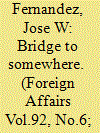

|
|
|
|
|
| Publication |
2013.
|
| Summary/Abstract |
International development has moved beyond charity. Gone are the days when the United States would just spend its seemingly bottomless largess to help less fortunate or vanquished countries, as it did after World War II. International development has reached a new, globally competitive stage, bringing with it enormous strategic and economic implications for the United States in the years ahead.
According to the Organization for Economic Cooperation and Development (OECD), the global middle class will grow from an estimated 1.8 billion people in 2009 to 4.9 billion in 2030. Nearly all of that growth will occur outside Europe and North America, from Brazil, China, and India to countries in the Middle East, North Africa, and Southeast Asia. Eighty-five percent of the growth will come in the Asia-Pacific region alone. The priorities of those countries will change along with their demographics. With more people escaping poverty, governments' focus is shifting from meeting basic needs to ensuring longer-term economic prosperity. Instead of handouts, nations are looking for investments to keep their middle classes employed. And more often than not, those investments are for infrastructure that enables and sustains growth.
|
|
|
|
|
|
|
|
|
|
|
|
|
|
|
|
| 6 |
ID:
128206


|
|
|
|
|
| Publication |
2014.
|
| Summary/Abstract |
International migration and diaspora has been one of the integral parts of the recent development discourse in academics as well as the policy domain, especially in the context of developing countries. Diaspora is seen as one of the emerging development actors as diaspora is perceived as creating economic, social and political capital through global network (Gaillard 1991, Meyer Brown 1999). Multilateral organizations have taken note of the significance of diasporic contribution towards the global development.
|
|
|
|
|
|
|
|
|
|
|
|
|
|
|
|
| 7 |
ID:
118660
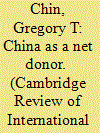

|
|
|
|
|
| Publication |
2012.
|
| Summary/Abstract |
The article examines China's emergence over the past decade as a net donor, and the implications of this status in global development. The analysis begins by outlining China's rise as a net donor, drawing comparisons in two-way aid flows with the other rising states, specifically Brazil, South Africa and India, and then turns to the implications of China's rise as an aid sender. The central argument is that conceptualizing China's rise as a 'net donor' is crucial for understanding the hybrid position that China has come to occupy in the global aid system, and the consequences of this positioning. Although China has achieved remarkable success with its own development, rather than join the Organization for Economic Cooperation and Development's Development Assistance Committee (DAC) regime of traditional donors, the Chinese Communist Party and government leadership has chosen instead to continue to self-identify with the countries of the South, and to construct ties of South-South cooperation outside of DAC arrangements. The Chinese leadership is trying to stake out an unprecedented position in the global aid system, traversing the North-South divide, despite the fact that China has already joined the ranks of world economic powers.
|
|
|
|
|
|
|
|
|
|
|
|
|
|
|
|
| 8 |
ID:
122362
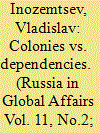

|
|
|
|
|
| Publication |
2013.
|
| Summary/Abstract |
It would be more logical to recognize only settler colonies as colonies per se and refer to all other results of expansion as dependencies. The loss of colonies is incomparably more dangerous for empires than the loss of dependencies. Trying to hold on to dependencies is meaningless, but to neglect the colonies is reckless.
|
|
|
|
|
|
|
|
|
|
|
|
|
|
|
|
| 9 |
ID:
085940


|
|
|
|
|
| Publication |
2009.
|
| Summary/Abstract |
The global development project faces newly evident challenges in the combination of energy, climate and food crises. Their interrelationships create a powerful moment in world history in which analysts and practitioners grope for solutions, limited by the narrow market episteme. This contribution argues that official development, in advocating green market solutions, recycles the problem as solution-a problem rooted in the geopolitics of an unsustainable global 'metabolic rift' and a discourse of global ecology reinforcing international power relations through monetary valuation, and deepening the North's 'ecological debt'.
|
|
|
|
|
|
|
|
|
|
|
|
|
|
|
|
| 10 |
ID:
094757


|
|
|
|
|
| Publication |
2010.
|
| Summary/Abstract |
The problems of development and security have historically formed distinct discourses. More recently, they have been inextricably linked both in discourse and in much policy, thus creating the so-called development-security nexus that pervades much of today's international development assistance. The empirical basis for attention to this nexus has been quite obvious given the many humanitarian emergencies occurring in the 1990s. It is less clear what, in terms of linkages, went before and what will come after. This article discusses the putative nexus in different historical geopolitical contexts, probing into its origins and speculating about the shape it may take in the future. It consists of three parts. The first deals with conceptual issues and the overall theoretical framework. The second describes four historical discourses, consecutively prevalent from about 1750 to 1980. The third concerns the current discourse on globalization and its possible future shape: global development.
|
|
|
|
|
|
|
|
|
|
|
|
|
|
|
|
| 11 |
ID:
122367


|
|
|
|
|
| Publication |
2013.
|
| Summary/Abstract |
The interaction within BRICS has drawn a variety of comments - from sarcasm to the expectation of miracles. But the aggravation of problems with the sustainability of global development in 2008-2013 has brought the role of those states into the limelight to show that global decisions will not be necessarily found inside Bretton-Woods institutions or the OECD.
|
|
|
|
|
|
|
|
|
|
|
|
|
|
|
|
| 12 |
ID:
153880
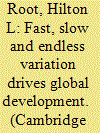

|
|
|
|
|
| Summary/Abstract |
This article explores the dynamics of institutional adaptation in fast-growing, highly interconnected polities in the developing world, and challenges the thesis in modernization theory which posits that economic growth and thus higher per-capita income lead over time to democracy. One mechanism often proposed to explain this link is the idea that economic growth and higher per capita income in a society lead individual citizens in that society to become more receptive to democratic values and norms, and that this receptivity can pave the way for the birth of democracy. Yet evidence increasingly demonstrates that the link is at best tenuous and often not empirically valid. Why have many fast-growing economies and modernizing societies not made a transition to democracy, as predicted by modernization theory? This paper addresses this question, with ideas from complex adaptive systems and evolutionary social psychology, as well as case analyses of Turkey and China.
|
|
|
|
|
|
|
|
|
|
|
|
|
|
|
|
| 13 |
ID:
154198


|
|
|
| 14 |
ID:
100801
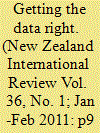

|
|
|
| 15 |
ID:
158775


|
|
|
| 16 |
ID:
085937


|
|
|
|
|
| Publication |
2009.
|
| Summary/Abstract |
Over the past 30 years rapid advances in the realm of digital technology and the establishment of an ever expanding globally networked communications infrastructure have radically altered the infrastructure of the global economy. Combined with new rules for international finance, the de-regulation of capital and labour markets and the embracing of a 'free trade' ethos by most states in the international system, today's 'information age' bears little resemblance to the economic world experienced by previous generations. Rapid economic changes have been accompanied by the broad dissemination of social, cultural and political information to all corners of the globe, a phenomenon that has contributed to a number of important socio-political developments. Using social movement theory to frame our analytical narrative, we investigate how the demands and pressures of globalisation have helped to foment 'Balik Islam', a religious-based social movement concentrated among the ranks of returned overseas Filipino workers in the northern island of Luzon. These workers, having converted from Catholicism to Islam while employed in the Middle East, are beginning to reshape the political fabric of the Republic of the Philippines, sometimes in a violent fashion. To illustrate the possible extremes of Balik Islam, the article will chart the rise and fall of the Rajah Solaiman Movement, a Balik-Islam group that was responsible for a number of recent terrorist attacks, and whose members, thanks to their ability to blend in with the dominant population, pose a special challenge to democracy.
|
|
|
|
|
|
|
|
|
|
|
|
|
|
|
|
| 17 |
ID:
105151
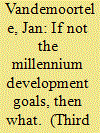

|
|
|
|
|
| Publication |
2011.
|
| Summary/Abstract |
Even if the MDGs are achieved, the world will still face unacceptably high levels of hunger, morbidity, mortality and illiteracy beyond 2015. Global targets can be drivers of change. The debate about the post-2015 framework should not be about the usefulness of global targets but about their improved architecture and enhanced relevance. After reviewing the good, the bad and the ugly that have happened since the MDGs were created, this article discusses several challenges and pitfalls in the process of defining the post-2015 framework, including the need to formulate the MDGs more clearly as global targets, to maintain their measurability, to focus on ends, to embed equality of opportunity, to include interim targets, and to conduct global summitry differently so as to make it better fit for purpose. A Peer & Partner Group is proposed as the global custodian of the MDGs in order to reduce undue donorship.
|
|
|
|
|
|
|
|
|
|
|
|
|
|
|
|
| 18 |
ID:
151679
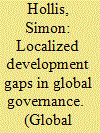

|
|
|
|
|
| Summary/Abstract |
Global framework agreements on disaster risk reduction aim to reduce the vulnerability of states from the effects of natural hazards and guide international development strategies. The effects of these agreements have surely saved lives and buffered shocks to economic systems. Yet there remains a gap between global aims and envisioned outcomes in local communities. This article argues that cultural determinants of risk, which shape the reception and translation of ideas on DRR, must be taken seriously if international organizations wish to enhance their efficacy and reduce vulnerability. Elucidating the importance that indigenous practices of resilience, time, and governance have for the global diffusion of DRR can help to reduce this gap and encourage more effective development policy in the future.
|
|
|
|
|
|
|
|
|
|
|
|
|
|
|
|
| 19 |
ID:
148801
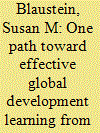

|
|
|
| 20 |
ID:
122348
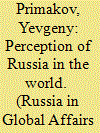

|
|
|
|
|
| Publication |
2013.
|
| Summary/Abstract |
The end of the Cold War did not put a stop to the confrontation between ideas and perceptions. The clash continues in various forms and in different situations across the board, but it has lost - and I would like to emphasize this - the mainstream nature of ideological clashes as a key factor determining global development.
|
|
|
|
|
|
|
|
|
|
|
|
|
|
|
|
|
|
|
|
|